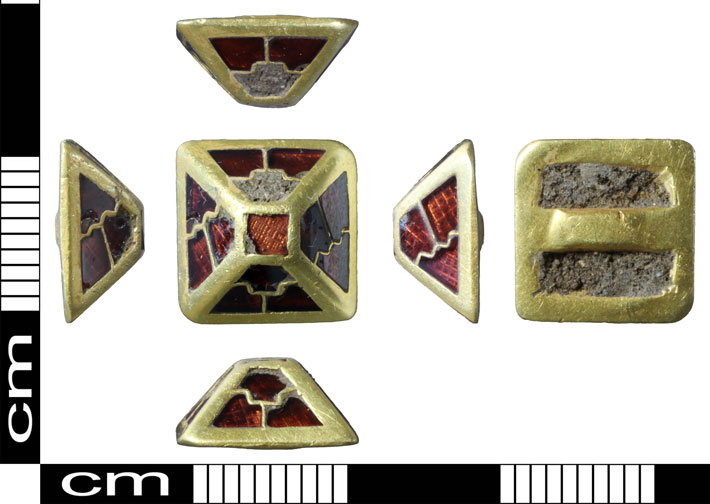Anglo-Saxon Sword Pyramid Found in England
A gold and garnet sword pyramid lost by a Sutton Hoo-era lord “careening around the countryside” on his horse has been discovered by a metal detectorist. The Anglo-Saxon object was found in the Breckland area of Norfolk in April.

Finds liaison officer Helen Geake said the garnets are Indian or Sri Lankan, revealing the far-flung nature of trade links in the 6th and 7th Centuries.
Sword pyramids come in pairs so its loss “was like losing one earring – very annoying”, she said.
The tiny 12mm by 11.9mm (0.4in by 0.4in) mount dates to about AD560 to 630, at a time when Norfolk was part of the Kingdom of East Anglia.
Dr Geake said: “It would have been owned by somebody in the entourage of a great lord or Anglo-Saxon king, and he would have been a lord or thegn [a medieval nobleman] who might have found his way into the history books.
“They or their lord had access to gold and garnets and to high craftsmanship.”
The extremely fine foil on its back is believed to have been created by techniques like a modern pantograph, used to reduce the size of the design.
The mounts were part of the system that bound a sword to its scabbard.
“It’s believed they made it a bit more of an effort to get the sword out of the scabbard, possibly acting as a check on an angry reaction,” Dr Geake said.

A more ornate pair were discovered at the early 7th Century ship burial at Sutton Hoo, which recently featured in the Netflix movie The Dig.
They are less commonly found in graves, but are “increasingly common” as stray finds, probably as accidental losses. Dr Geake said: “Lords would have been careening about the countryside on their horses and they’d lose them.”
The find has been reported to the Norfolk Coroner, as required by the Treasure Act.
